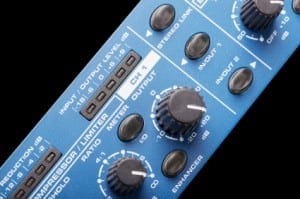What is a Limiter? (and When Should You Use One)
Though compression is used on nearly every instance of recorded live audio, there still seems too often be some confusion as to what exactly compression is, and when (and how) you should use it. Limiters are typically even more misunderstood, so today we wanted to take a look at exactly what a limiter is, and when they come in handy for your recordings.

A Limiter IS a Compressor...
Part of the confusion concerning limiters is that many try to distinguish between a limiter and a compressor, when in fact they are technically the same thing, it’s just that they are used differently. It could be said that a limiter is an extreme version of a compressor.
As we’ve written before, a compressor is simply a tool that reduces the dynamic range of an audio track. This is done for a number of reasons, and is primarily responsible for evening out the volume of a track. But while compressors are typically used in a way as to make them transparent on a song (i.e. you can’t hear the compressor pulling down the volume of certain parts), a limiter plays a different role.
... But Not All Compressors are Limiters
To get the aforementioned transparent sound when using a compressor, you often set a very low ratio. For example, a ratio set to 2:1 means that for every 2 dB the input signal volume goes over the threshold, the output will only actually be 1 dB higher. Limiters however, use very high ratios, often ratios that aren’t available on compressors, hence why not all compressors are limiters.
Typically, a compressor is being used as a limiter when its ratio is set to 20:1 or higher. That means that the threshold essentially becomes the “limit” of the volume level. This often results in “blocked off” sound waves, as the peaks of a wave are essentially shaved off into a flat line. A track with this often is described as being squashed, because the peaks are squashed down, reducing the dynamic range.
Not For Use in All Situations
As you’d expect, limiters have much more limited use than compressors -- after all, you typically don’t want your dynamic range reduced to nearly zero. However, limiters can be extremely helpful in certain situations, and are often used in the mastering process.
While there’s no one “right” way to use a limiter, a good rule of thumb is to set a fairly high threshold, so that not all of your dynamics are reduced. A high threshold will allow you to control the excessive peaks without losing all of your range.
Another note: though we mentioned that limiters are often used in audio mastering, this does not imply that slapping a limiter on your final mixdown track constitutes mastering. Limiters are used in the mastering process along with a number of other tools and techniques. Many recording at home will use a limiter purely to make their mixes louder, when all that really happens is you reduce your mix to a lifeless audio track with no dynamics. So while limiters are great in certain situations, be careful not to overuse them.




